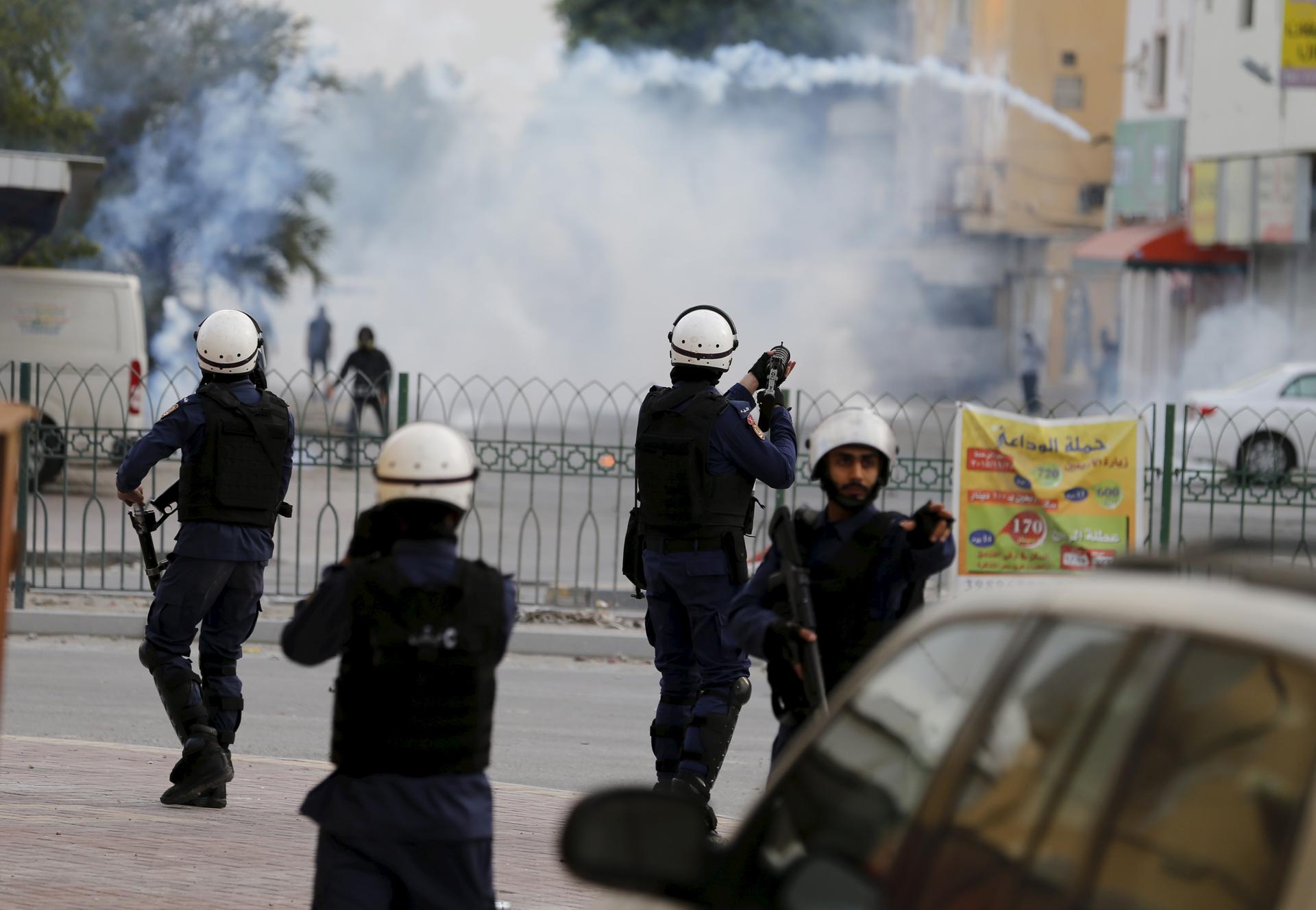Riot police fire tear gas at protesters during clashes after a protest against the execution of prominent Shiite Muslim cleric Nimr al-Nimr by Saudi authorities in the village of Sitra south of Manama, Bahrain, January 5, 2016.
It might be hard to remember that the tiny island of Bahrain in the Persian Gulf was one of the places where the Arab Spring caught on.
Back in 2011, protesters gathered in the Pearl Roundabout and demanded reforms. Clashes erupted between the protesters and the Bahraini government. But soon the government quashed the protests with help from Saudi Arabia and the United Arab Emirates.
As the protesters retreated and as conflicts broke out elsewhere in the region, international media packed up and moved on.
Except for a few reporters.
Anna Therese Day went back to Bahrain last month to find out what has become of the uprising. Along with her camera crew, they headed to a Shiite-majority neighborhood in Manama, called Sitra — one of the places where clashes between Bahrainis and the government continue to this day.
"Most of the popular demonstrations have been pushed off the main thoroughfares of the island," Day explains, "so you can drive down the highways and it looks like this glistening Gulf kingdom. But if you look off the highways into the neighborhoods, you can see clouds of smoke and these clashes have been happening with the police every single day since February 14, 2011."
Day and her team were on the ground in Bahrain to report, but they had decided to enter the country on a tourist visa. According to Day, if they had requested a journalist visa, they would have been assigned a government minder and that could have put their sources in danger.
"We didn't come to do a press tour with the government," she says. "We came to report on the repression of the regime."
But the Bahraini government wasn't happy with this arrangement. Day and her crew were arrested and taken to a police station. They were deprived of food, water and medicine and prevented from calling their families or the US Embassy.
Finally, after 48 hours of negotiations between the US State Department and Bahraini government, they were released and deported. She wrote on Facebook:
"My team and I feel very fortunate to have been permitted to leave Bahrain. We are overwhelmed by the events of the past week and by the support shown to us from around the world. We are especially grateful to the people of Bahrain who helped us in a variety of ways throughout the challenges of our detention. We would also like to thank the US Embassy Bahrain and U.S. Department of State for their assistance.
Thank you to our families, our friends, our colleagues, and the thousands of strangers who sent their love and support to us. We are so grateful to you all. We are safe, in good health, and grateful to get home to our loved ones.
Finally, we are incredibly grateful to those freedom of expression and human rights organisations, Bahraini and international, that supported us and who support media workers and human rights defenders all over the world every day. We would like to pay tribute to you and to the brave journalists who work in difficult environments around the world, many of whom are less fortunate than we are: those who cannot simply get deported on a plane and go home, many who languish in prison today, and some who have been killed, just for doing their jobs. We are humbled by and grateful for your tireless work on these issues. Gulf Center for Human Rights مركز الخليج لحقوق الإنسان, Bahrain Center for Human Rights,Committee to Protect Journalists, Rory Peck Trust, Reporters Without Borders, Human Rights Watch, ImportantCool, IWMF, UN Foundation and my family at Frontline Freelance Register to name a few…
Before they left for the airport, Day and her crew stopped by their apartment to pick up their gear, only to find that the place had been ransacked.
"[There were] bottles broken, clothes thrown everywhere, all of our electronics gone," Day says, adding that the group is missing about $20,000 worth of gear.
Day and her team have filed a lawsuit against the Bahraini police, but the police has also opened an investigation on them.
Day thought carefully about how to get out the footage they had shot of the activists in Bahrain, speaking out against the human rights abuses in the kingdom. Day kept the memory cards in a safe place during her reporting, but when it came time to leave Bahrain, she had to come up with a plan to smuggle the footage out.
"Not only did we want to get the material out to tell the story, but we also would have risked the arrest and possible lives of some of our sources, had they been able to access these memory cards," Day explains, "so I did carry them within my body cavity."
Back in the US, Day says Bahrain still remains on her mind. She says it's important that Americans keep up with what is happening there. Bahrain remains one of America's biggest allies in the Middle East. One of its largest, most significant foreign military installations in the world is based just off the Bahrain coast.
"When we were in police detention," Day says, "we could actually see American servicemen from the window of a police station that has been used to torture and round up political protesters."
It was a "stark juxtaposition" for Day, given the democratic values her homeland aspires to.
Update: This story has been updated to clarify details of the uprising.
Every day, reporters and producers at The World are hard at work bringing you human-centered news from across the globe. But we can’t do it without you. We need your support to ensure we can continue this work for another year.
Make a gift today, and you’ll help us unlock a matching gift of $67,000!
